- About Us
- Columns
- Letters
- Cartoons
- The Udder Limits
- Archives
- Ezy Reading Archive
- 2024 Cud Archives
- 2023 Cud Archives
- 2022 Cud Archives
- 2021 Cud Archives
- 2020 Cud Archives
- 2015-2019
- 2010-2014
- 2004-2009
 |
Cud Flashes In The Pan |
This month’s theme:
Compound-Adjective Groaners
The title of this month’s theme is “Compound-Adjective Stories” and NOT “Compound Adjective Stories.” The former means “stories about compound adjectives”; the latter means “adjective stories that are compound.” There’s a basic difference, but it’s rarely used correctly and is often perceived as incorrect. So this month we’ll do silly stories that rely on groaners that show how the lack of a hyphen changes a compound adjective into something else.
There are arguments for exceptions, but again we’re just having fun here. But as an example, if I said “He had seven year old children” you might be unclear whether I mean that there are seven children each a year old (seven year-old children) or children who are seven years old (seven-year-old children). If the adjectives preceding a noun are joined together in describing that noun, it’s a compound adjective and generally should be hyphenated. I like rules that are always applied so that no one has to guess whether or not a reader might find it ambiguous.
So let’s have a few groans. In the spirit of the theme, there will be hyphenated compound adjectives throughout.
BONUS! Since this is January, and thus All Things Lit month, I’ve named each story with a quote from a movie that tenuously relates to the story, and offered a brief review of the movie. Watch all eight! I dare you.
“These Go to Eleven”
Quote from This Is Spin̈al Tap (1984): This is one of the best and funniest mockumentaries ever, and the one that took the heavy-metal umlaut to a new level. Timeless and perfect.
Compound-adjective story
By David M. Fitzpatrick
The crowd roared when he took the stage. They had waited all night at the outdoor-stage festival for this one. They came to their feet as he walked out, waving to them, and sliding his custom-carved glider chair with him. It was the chair that many others had emulated, but no matter how good the emulation was, no one could work the chair like he did.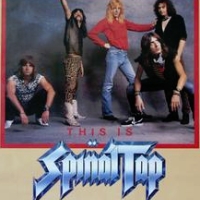
He’d crafted this platform rocking chair with his own two talented hands. It looked like an antique, but it was barely ten years old. Die-hard fans knew that he’d worked on it for weeks—day and night—in his wood shop. And this cherry-stained baby could take a beating.
As the crowd chanted his name, he sat in the chair and began gliding back and forth, and the crowd went wild. The glider was suspended from the frame, and horizontal feet rested on the stage. When his back-and-forth gliding couldn’t get any more exciting, he hit whipped out his remote control and thumbed the button that popped out the four big wheels on the bottom of the feet.
The crowd screamed its love as he rode the chair in figure eights around the stage, all the while gliding back and forth. The crowd screamed it approval, and he set loose as if someone were controlling him like a marionette. Forward and backward he went, and the wheels let him roll wildly across the stage in every direction, even as he glided, non-stop, back and forth in the chair’s frame.
And the crowd began chanting, “Rock and roll legend! Rock and roll hero! Rock and roll master…!”
“I’m Freakin’ Out, Man”
Quote from Super Troopers (2001): After 17 years, we will finally get a sequel to one of the funniest movies I have ever seen—and this is from a guy who otherwise is not much of a fan of Broken Lizard’s stuff. I have watched this repeatedly and it always makes me laugh. If they do half as good with the sequel, it will be OK.
Compound-adjective story
By David M. Fitzpatrick
Billy and his two buddies met out behind the brick-walled gymnasium at the edge of campus. It was their free period, and they always met out by the bushes and brambles. No college faculty or staff ever came out there to interrupt them.
“I am so glad this is legal now,” Steve said as he dug out his plastic bag.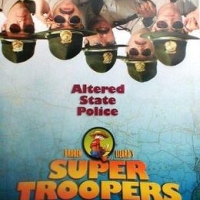
“Just hurry up and pack that bowl,” Billy urged him. “I need it bad after Miss Blake’s class.”
“Aw, man, she’s beautiful!” Enrico said. “That is the finest teacher in this entire college. And those low-cut blouses? Damn!”
“Yeah, well, that’s the only good thing about her English class. It’s bad enough they’re making me take it after four years of it in high school.”
“What’s bad about it?” Steve asked. He was packing it into an ornate glass pipe.
“Well, English class is never great, no matter how hot the teacher is. But today… man, she harped on and on about freakin’ compound adjectives. How we gotta put hyphens between two words that describe a noun. You know, like, ‘Miss Blake’s low-cut blouse.’”
“Or ‘Miss Blake’s long-black hair,’” Steve said, flicking his lighter and dragging on the pipe.
“No, dummy. No hyphen there. Come on, pass that over.”
Steve finished inhaling and handed it off. Billy followed suit. He held his breath after passing it to Enrico. Soon the boys were coughing as they exhaled.
“We should really quit this,” Billy said.
“Why, man?”
“Well, you know, we have to think about our futures,” Billy said. “After being high-school students for four years, we’re in college now. We can’t spend four years of college being high school students.”
“You’re Gonna Need a Bigger Boat”
Quote from Jaws (1975): The movie that created the concept of the summer blockbuster. In an era of cheesy monster flicks on cable, the younger set might be bored by this, but this is suspense gold nearly 43 years after it was first released.
Compound-adjective story
By David M. Fitzpatrick
The moment Camille and Leroy entered the seafood diner, they saw the big crowd gathered in the main dining room. The crowd had to be a six people deep, with patrons on tiptoes trying to see what was happening. There was laughter and excitement in the air.
“Is someone hurt?” Camille asked. “Did someone choke?”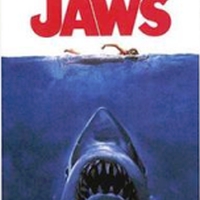
“I don’t think so,” Leroy said. “Everyone is oohing and ahhing. Can’t be too bad.”
The pair moved in and tried to find a way to see as the short-order cook hollered out orders that were up. There was just no room for them to see what was going on, but Camille was determined to find out what the fuss was about.
“Let’s get up on chairs,” she said, motioning to a table that had evidently been vacated by the eager-beaver gawkers.
They slid two chairs close to the edge of the throng. They climbed on them and, on tiptoes, beheld what was going on.
In the corner, a man sat alone at a table. On his plate before him was a truly gigantic slab of fish.
“I don’t get it,” Leroy said.
Then Camille saw the sign on the wall: TODAY’S BLUE-PLATE SPECIAL: MAKO.
“Oh, now I see,” she said. “It’s supposed to be dangerous, because they live long and eat other fish, so they build up excessive mercury in their bodies. That’s why everyone is amazed—it’s a man eating shark.”
“If I’m Curt With You, It’s Because Time Is a Factor”
Quote from Pulp Fiction (1994): Quentin Tarantino proved his worth with this one. We’ll never know what was in the briefcase, but we don’t need to. The characters you meet, and the bizarre scenes yousee, will be burned into your memory forever.
Compound-adjective story
By David M. Fitzpatrick
Sally and John returned home to find that someone had broken into their home. The perp had apparently burgled just the living-room contents, stealing the HDTV, the Blu-ray player, the sound system, and the movie collection. Sally called the police while John took stock of the damage.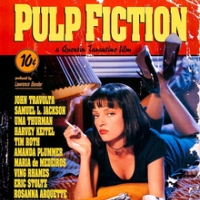
It was extensive. The burglar had been a big-time jerk; he’d not just stolen things, but ruined the living room. He’d ripped down the drapes, torn up the carpet, broken the windows, and gouged holes in the walls. He’d cut open the sofa and pulled out stuffing and foam.
The police surmised that the thefts and damage was limited to the living room only because the thief or thieves had been frightened off, possibly by Sally and John returning home. After the police took the report and left, Sally said, “John, our living room is destroyed! We have a party with our friends tomorrow night and we need to have this room usable. What are we going to do?”
“It’s okay, honey,” Jack said, whipping out his phone. “I have a guy. He specializes in fixing damaged rooms, and he works fast.”
It only took the guy thirty minutes to arrive. He pulled up in his service van with his business name plastered on the side. He leaped out, grabbing his bag, and ran to the house. John let him in with a brisk handshake and showed him to the living room.
“Well, this is quite a complete-disaster event,” the man said. “But no worries. I specialize in repairing damage like this very quickly. Give me tomorrow and I’ll have this living room fixed, healed, sutured, and put back together.”
“Who… who ARE you?” Sally asked.
The man smiled. “Never fear, ma’am. Like it says on the side of my van, I’m the Emergency Room Doctor.”
“I’ve Never Felt This Way Before”
Quote from Desert Hearts (1985): Perhaps THE lesbian love story, and released in the conservative Reagan era when lesbian love stories might well have destroyed the careers of those involved.
Compound-adjective story
By David M. Fitzpatrick
Ginny Hanson and Rita Dover wanted to get married. But they had different opinions on just about every facet of the wedding plans.
Ginny wanted to get married in a Catholic church. Rita wanted a Protestant church. They settled on a public garden with a rabbi officiating; their witnesses would be a Muslim friend and an atheist friend.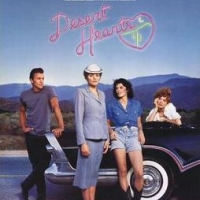
Rita wanted the wedding party to wear two shades of blue. Ginny wanted pink and red. They let the men wear Rita’s colors and the women Ginny’s.
Ginny preferred red roses. But Rita just loved white carnations. They ended up with roses and carnations, each in red and in white.
Rita thought that they should wear identical white-lace and white-satin dresses. Ginny felt that they should be completely different. So they chose unique dresses with identical trains and veils.
They both wanted to combine their last names. But Ginny wanted it to be Dover-Hanson and Rita wanted it to be Hanson-Dover. They decided to become Ginny Dover-Hanson and Rita Hanson-Dover.
Rita wanted a narrow, five-tier wedding cake. Ginny wanted a smaller, wider two-tier affair. The merged the ideas into a three-tier dessert.
Ginny and Rita disagreed on just about everything, but not once did their disagreements cause them strife. They accepted that they each wanted different things, and they worked to compromise on all of them. Along the way, they were always happy. They found joy in their differences, and they found satisfaction in finding common ground. They laughed through it all, and always had smiles on their faces.
They told everyone that it was an absolutely gay marriage debate.
“Never Give Up, Never Surrender”
Quote from Galaxy Quest (1999): A hilarious satire of Star Trek. Still hilarious after 19 years. If you’re a Trekkie, you’ll love it. If you’re not, you still should. If you think Star Trek: Discovery and the JJ Abrams reboot is Trek and the old series suck, you’ll hate it.
Compound-adjective story
By David M. Fitzpatrick
Allie’s business was in trouble. She’d sunk everything she had into her greenhouse, including a second mortgage on her house. But a windstorm had ripped the greenhouse open and she’d lost so many flowers so early in the spring, when the outside cold did its damage. She needed help or everything that she knew would be lost.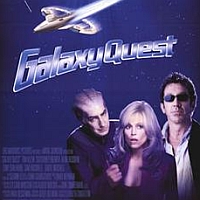
A friend told her about a place downtown that purported to help businesses like hers, so she headed down the next day. She found the place easily enough; it was at the edge of downtown in an office building, and she could see the sign in the second-floor window. Her heart leaped, because it sounded exactly like what she needed.
She parked and found the entrance and raced up the stairs. It was an old building, a bit shabby inside, but full of professional offices: a computer-repair shop, a real-estate agent’s office, a private-investigative service. On the second floor, she found her target at the end of a dingy hall. Allie’s heart pounded in anticipation. Could this hole-in-the-wall organization in this tiny-house office be able to save her?
She opened the door outward and stepped into a surprisingly spacious and clean office. The place was big enough for six desks, but there was just one, with a man behind it. He was surrounded by an array of computers, printers, and filing cabinets. Two comfortable chairs sat on a rug before his desk. There was a coat rack and a waiting area.
“Welcome!” the man said. He was pleasant and very professional. “How can I help you?”
“I’m not sure, but if anyone can, it’s you,” Allie said. She launched into a fast-talking, bordering-on-emotional description of her one-woman greenhouse business and how it had been nearly destroyed, and how she was desperate for any help that she could get. He listened intently, but with a look of sadness on his face, until she finally finished.
“I’m afraid you’ve come to the wrong place,” he said. “I’m a CPA and tax preparer who specializes setting up and clerking for corporations. You need to find money to stay in business, and I’m afraid that isn’t the sort of thing that I do.”
She gave an open-mouthed start. “But… but your sign outside! It says you help small businesses!”
“Maybe I should introduce myself,” he said. “My name is Derek Small. The name of my company is Small Business Services.”
“Football Is 80% Mental and 40% Physical”
Quote from Little Giants (1994): I am not a football fan. But, come on… Rick Moranis AND Ed O’Neill? Comedy gold.
Compound-adjective story
By David M. Fitzpatrick
No one could see a thing. It was after midnight, and they were under a moonless sky. It was overcast with thick clouds that didn’t even admit starlight. The two teams had arrived at the wide-open field in the woods; once all of their cars’ headlights were off, they might as well have been blind.
“Maybe our eyes will adjust,” one of the guys said.
“To what?” another said. “There’s no light! I can barely see any of you.”
“Who has the ball?”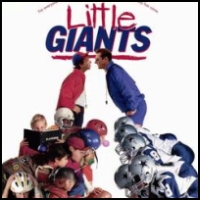
“I do.”
“Well, we can’t kick it off, or we’ll never find it. You guys possess first. Line up.”
“Where?! I can’t see the middle of the field. And what are the goalposts?”
“Up by the cars there’s a row of blueberry bushes. That’s yours. And at the other end is a mud-puddle trench. It’s wet, but it will do.”
“Are we in the middle?”
“I have no clue. Let’s just line up here.”
Bodies bumped into each other as the guys felt their way around in the abyss-black night. The saving grace was that one team was playing without shirts, so they could at least line up on the right sides with their night-blind teammates.
“Move over.”
“Stop hitting my head.”
“Sorry, dude.”
“Are we ready?”
“Yes. I’m going to snap the ball. Is my quarterback behind me?”
“I think so. I hear you, but I can’t see you. Snap it low! Okay… twenty-five… thirty-one… forty-two... HIKE!”
He snapped the ball, and everyone charged and bumped into everyone else. There was a lot of swearing and people falling.”
“Are you running it?”
“I don’t have it!”
“I snapped it to you!”
“I DON’T HAVE IT!”
More swearing. It was some extremely filthy-mouth stuff.
“Okay, someone find the ball. Maybe we should put a little LED light on it. I have one on my keychain.”
“That might work. Otherwise, guys, I have to tell you… there’s no way, without at least the moon, that we’ll possibly succeed at Monday night football.”
“The Eyes Are the Nipples of the Face”
Quote from The House Bunny (2008): I was honestly surprised that this movie was as good as it is. I expected nothing and got a funny movie that was far beyond a vapid excuse for T&A. There is vapidity and clothes T&A, but the movie is more than that.
Compound-adjective story
By David M. Fitzpatrick
Barry was in no mood for company, given that Carrie-Ann had dumped him just the night before and moved out. So when the doorbell rang, he was ready to tell off whatever wrong-day, wrong-time idiot had been unlucky enough to show up at his door.
He stomped down the stairs as the doorbell sounded again, so he roared, “Just a damn minute!” Then he reached the front door and threw it open, hoping that his furious scowl was as dark and frightening as he was trying to make it.
Barry stopped cold when he saw who was there.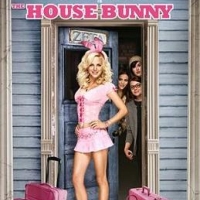
She was right out of the pages of the Sports Illustrated Swimsuit Edition, especially given that she was wearing a hot-pink string bikini. But in that instant, he checked himself on that: No, she was out of a porn magazine, in that first shot before the bikini came off. She stood nearly his height, mostly because of the stiletto heels she wore. Her long blond hair cascaded down around her face, over her shoulders, and down her back; the tips teased the upper edge of her bikini top. She was tanned from head to toe, and her big, pouty lips were glossed in bright-red lipstick. She was a stunning specimen of woman, from her D-cup breasts straining against the very little fabric of the bikini top to her narrow waist to her broad hips.
Barry felt the scowl transform into a dumbfounded look. He tried to not to ogle her, but there was just no stopping it. She knew it, smiling seductively and turning slightly sideways, putting a hand on her hip and thrusting that hip toward him. It gave him a good look at her backside, and it was one of the finest derrieres he had ever seen. The bikini bottom, he saw, was definitely a thong flossing her crack.
“I’m pleased you approve,” she said, purring like a kitten, and she finished turning, doing a slow three-sixty to let him look. When she faced him again, she casually grabbed the thin waistband of the front of her bikini bottom and pulled it upward to just hint at the shape of what was beneath.
Barry knew he was gone. “Can I help you?” he squeaked.
“I’m selling something,” she said. “Would you like to see?”
He nodded, mute and shaking, and when she gestured for him to follow, he did. He watched the incredible sway of her backside as she went down his walk, and when they reached the street he realized that her car was parked at the curb, running, and inside there was a lot of noise.
The woman giggled. “Aren’t they adorable?”
Barry looked in and saw them. There had to be seven of them back there—no, eight. Make it nine. Nine puppies, all apparently Golden Retrievers, and they were playfully climbing over each other, yipping excitedly at the sight of their returning owner.
“I have so many, but I’m getting them into good homes really cheap,” she said, meeting Barry’s gaze. She stepped closer as he faced her, and she pressed her breasts against his chest and ran her hands up his arms. “What do you say? Will you take one or two of these super-cute puppies off my hands?”
“Wow,” Barry breathed. “You are a hot dog vendor.”
David M. Fitzpatrick is a fiction writer in Maine, USA. His many short stories have appeared in print magazines and anthologies around the world. He writes for a newspaper, writes fiction, edits anthologies, and teaches creative writing. Visit him at www.fitz42.net/writer to learn more.
